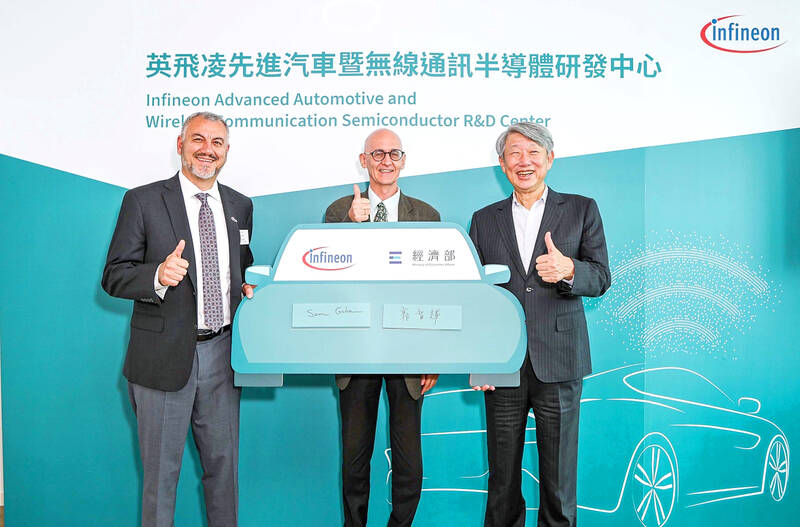Infineon Technologies AG, a world-leading automotive chip supplier, yesterday said it plans to set up a NT$1.2 billion (US$37.05 million) research and development (R&D) center in Taiwan with government funding of NT$480 million to develop next-generation Wi-Fi and Bluetooth chips for electric vehicles in collaboration with local partners.
Infineon is the latest among a slew of global semiconductor companies seeking to operate R&D centers in Taiwan given a resilient semiconductor ecosystem. Taiwan Semiconductor Manufacturing Co (TSMC, 台積電) makes advanced automotive chips for Infineon and NXP Semiconductors NV in Taiwan.
Under similar government initiatives, Nvidia Corp has set up its first artificial intelligence (AI) R&D center in Taiwan with total investment of NT$24.3 billion, including NT$6.7 billion in government subsidies, and is considering establishing a second one.

Photo courtesy of Infineon Technologies AG
Advanced Micro Devices Inc (AMD) is reportedly seeking government support to build a R&D center in Taiwan with total investment of NT$5 billion.
Infineon’s new investment is part of the “A+ Global Innovation Partnership Initiative Program,” an initiative launched by the Ministry of Economic Affairs to accelerate Taiwan’s development of cutting-edge technologies by leveraging the strength of global industry leaders.
Infineon alone would inject about NT$720 million to establish the “Infineon advanced automotive and wireless communication semiconductor R&D center,” upgrading its existing Wireless Communication R&D Lab in Taiwan.
The R&D center investment, the first among European automotive chip manufacturers, would create NT$60 billion in production value for local automotive electronics, Infineon said in a statement yesterday.
The project would cover the entire R&D process for Infineon’s next-generation, automotive-grade Bluetooth chip that is to be carried out in Taiwan, the statement said.
This includes the involvement of international automotive electronic R&D experts, facilitating exchanges with local researchers and industry clients, and transferring expertise in the automotive domain, the German chipmaker said.
The goal is to complete the entire development process of next-generation Bluetooth chip design in Taiwan, from chip design and production to chip packaging and testing, it said.
“We are impressed by Taiwan’s dynamic innovation ecosystem, including its highly skilled R&D talent and strong industry clusters. Building on our strong foundation of existing partnerships with many Taiwanese companies, Infineon now significantly increases its R&D activities. We look forward to further enriching and broadening our collaborative efforts with our local partners,” Sam Geha, executive vice president of Internet of Things, compute and wireless business at Infineon, said in the statement.
Infineon is to team up with research institutes and technology-savvy schools, including the Industrial Technology Research Institute (工研院), National Taiwan University, National Cheng Kung University and National Taipei University of Technology, as well as multiple Taiwanese network module manufacturers and automotive system developers.
The collaboration is to focus on developing wireless communication technologies such as Wi-Fi and Bluetooth chips and solutions for wireless battery management systems, next-generation smart cockpits, and smart car access systems.

Nvidia Corp chief executive officer Jensen Huang (黃仁勳) on Monday introduced the company’s latest supercomputer platform, featuring six new chips made by Taiwan Semiconductor Manufacturing Co (TSMC, 台積電), saying that it is now “in full production.” “If Vera Rubin is going to be in time for this year, it must be in production by now, and so, today I can tell you that Vera Rubin is in full production,” Huang said during his keynote speech at CES in Las Vegas. The rollout of six concurrent chips for Vera Rubin — the company’s next-generation artificial intelligence (AI) computing platform — marks a strategic

REVENUE PERFORMANCE: Cloud and network products, and electronic components saw strong increases, while smart consumer electronics and computing products fell Hon Hai Precision Industry Co (鴻海精密) yesterday posted 26.51 percent quarterly growth in revenue for last quarter to NT$2.6 trillion (US$82.44 billion), the strongest on record for the period and above expectations, but the company forecast a slight revenue dip this quarter due to seasonal factors. On an annual basis, revenue last quarter grew 22.07 percent, the company said. Analysts on average estimated about NT$2.4 trillion increase. Hon Hai, which assembles servers for Nvidia Corp and iPhones for Apple Inc, is expanding its capacity in the US, adding artificial intelligence (AI) server production in Wisconsin and Texas, where it operates established campuses. This

Garment maker Makalot Industrial Co (聚陽) yesterday reported lower-than-expected fourth-quarter revenue of NT$7.93 billion (US$251.44 million), down 9.48 percent from NT$8.76 billion a year earlier. On a quarterly basis, revenue fell 10.83 percent from NT$8.89 billion, company data showed. The figure was also lower than market expectations of NT$8.05 billion, according to data compiled by Yuanta Securities Investment and Consulting Co (元大投顧), which had projected NT$8.22 billion. Makalot’s revenue this quarter would likely increase by a mid-teens percentage as the industry is entering its high season, Yuanta said. Overall, Makalot’s revenue last year totaled NT$34.43 billion, down 3.08 percent from its record NT$35.52

PRECEDENTED TIMES: In news that surely does not shock, AI and tech exports drove a banner for exports last year as Taiwan’s economic growth experienced a flood tide Taiwan’s exports delivered a blockbuster finish to last year with last month’s shipments rising at the second-highest pace on record as demand for artificial intelligence (AI) hardware and advanced computing remained strong, the Ministry of Finance said yesterday. Exports surged 43.4 percent from a year earlier to US$62.48 billion last month, extending growth to 26 consecutive months. Imports climbed 14.9 percent to US$43.04 billion, the second-highest monthly level historically, resulting in a trade surplus of US$19.43 billion — more than double that of the year before. Department of Statistics Director-General Beatrice Tsai (蔡美娜) described the performance as “surprisingly outstanding,” forecasting export growth